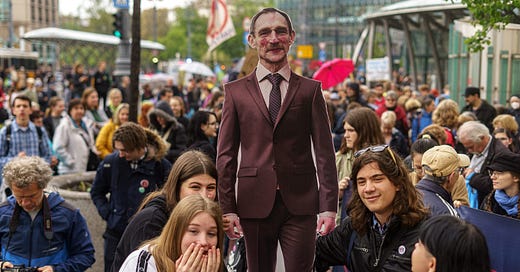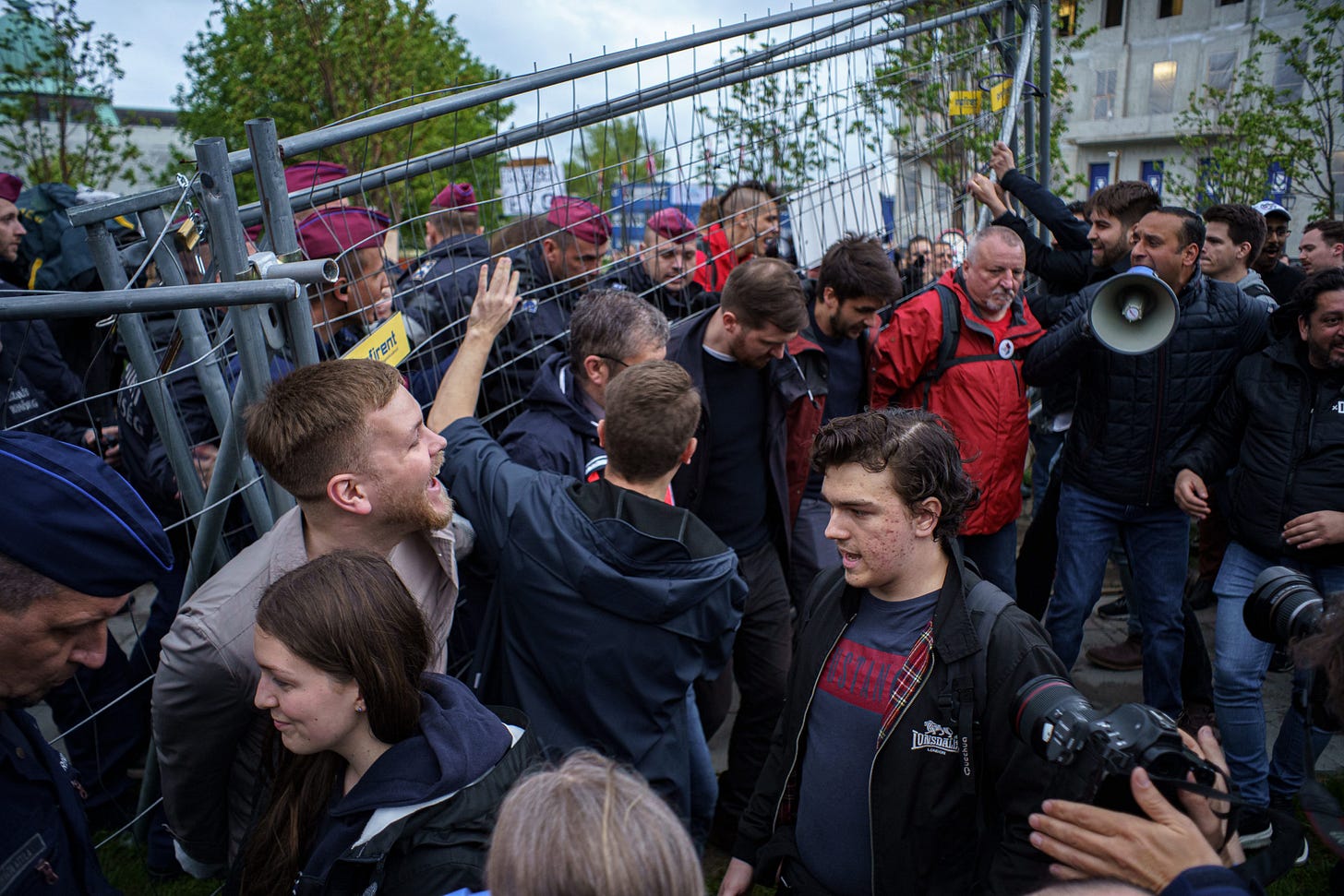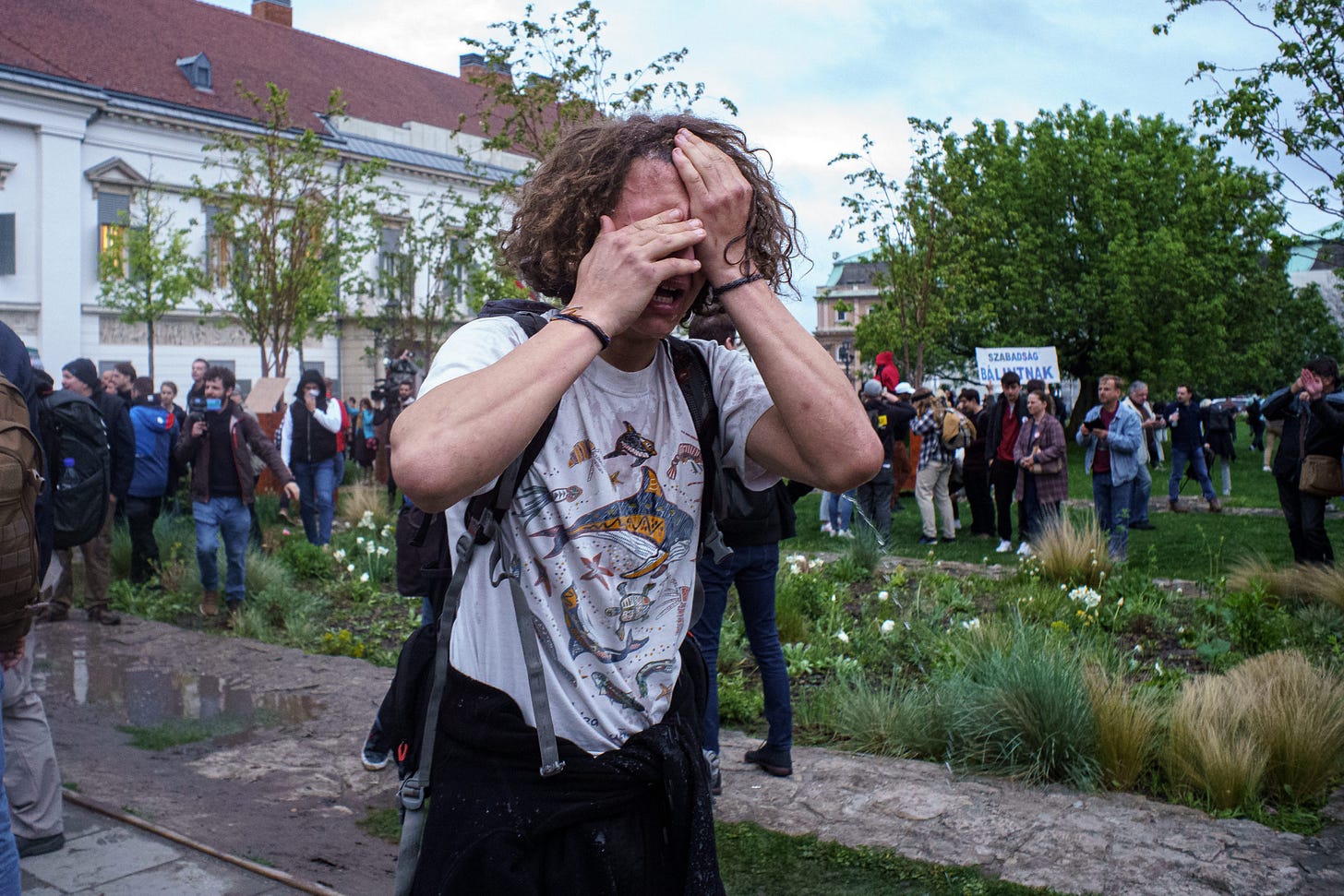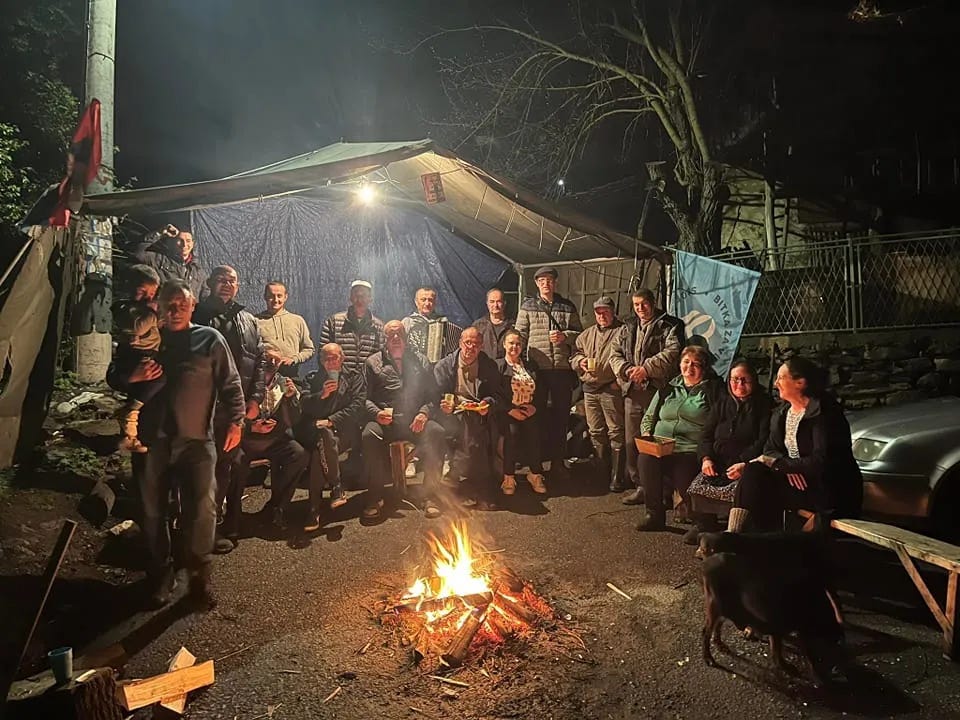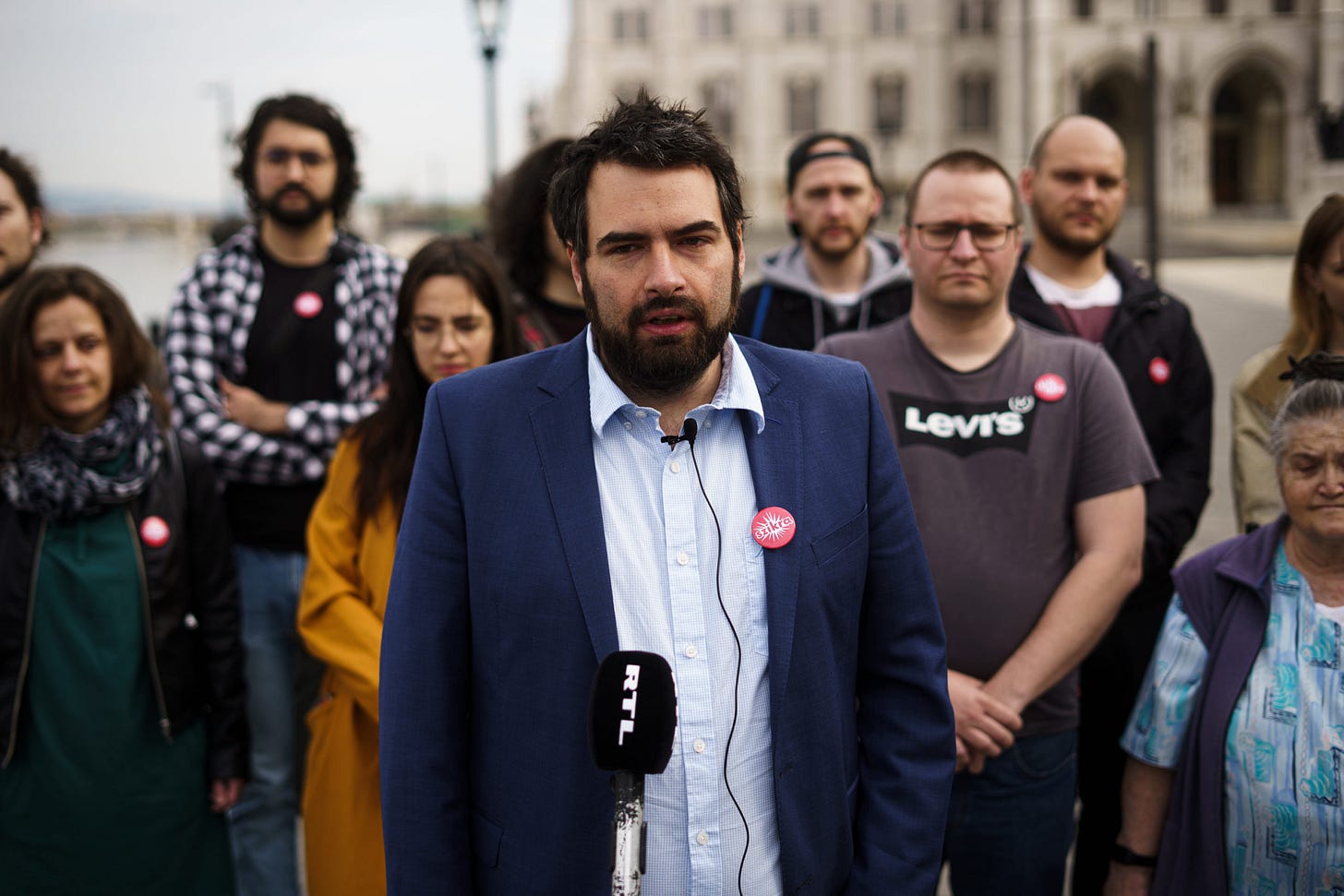Issue #2 of East European Context (EEC), a newsletter of the Eastern European Left Media Outlet (ELMO).
Many of us experience every day the systemic lack of news regarding the social realities of Eastern Europe, the absence of context in the information provided by mainstream media, and the internal fragmentation of news sourcing due to the prevalence and effects of social media. EEC aims to fill this void with a weekly newsletter, with the help of journalists and activists from the region. We welcome contributions.
On May Day we bring news about workers and the conditions of work from Greece, Hungary, Latvia, Moldova, Romania, Ukraine, and Serbia.
Please share, distribute, and participate by sending suggestions to easteuropeancontext@gmail.com!
Leading Stories
Teachers’ Strikes in Latvia and Hungary
Mérce, Public broadcasting of Latvia
On 24 April, education workers in Hungary and Latvia went on strike and held a demonstration on the day of the industrial action.
The Latvian Education and Science Workers' Union (LIZDA) decided to strike because the government failed to honor an agreement it made with the union last year.
The government subsequently made the promised pay rise and additional funding for the sector conditional on "rationalizing the education system", which in practice usually entails cutbacks and reorganizations that lead to increased workloads.
The government has also attempted to divide workers of different sectors.
“The second option would be dividing money, which means taking money away from someone. "Then please show where we should take the money away! From defense? In the current geopolitical situation? From pensioners? From doctors? From police officers?" said Prime Minister Krišjānis Kariņš, according to Latvian public media.
More than a thousand health workers joined the teachers' demonstration on April 24th, while approximately 19,000 workers took part in the three day long teachers' strike.
The strike ended with a conceptual agreement between the union and the government. The deal included an increase in teachers' pay, with additional funding of €4.168 million. Head of the union Inga Vanaga, said that, along with local governments, they will soon evaluate whether the funding is sufficient "without excluding that there may be protests."
According to the OECD, there were 0 strikes per thousand inhabitants per year from 1991 to 2010 in Latvia, which shows the importance of the current dissatisfaction of workers in relation to the economic crisis.
In Budapest, thousands of students and teachers demonstrated for a pay rise, for better working conditions, and against a new law that would mean a series of rights cuts for teachers. Prior to the event, civil and trade union activists and politicians held a sit-in in front of the Ministry of the Interior in the morning. During the day, teachers held a national strike day.
After the demonstration, part of the protesters marched to Viktor Orbán's office in the Buda Castle. The demonstrators, together with opposition politicians, tried to dismantle a cordon that is used to prevent journalists from entering the area during government meetings. The police dispersed the crowd with tear gas.
The teachers' unions are demanding a substantial pay rise, a reduction in working hours, and the restoration of their right to strike. Last year, the government significantly restricted teachers' right to strike. Supervision has to be provided and teachers have to hold 50 percent of classes in the event of a strike. Unions say this effectively deprives the strike of any meaning. Since the restriction was introduced, thousands of teachers have gone on wildcat strikes, which they call "civil disobedience”.
In Hungary, annual inflation surpassed 25% in March, the highest in the EU, ahead of Latvia’s figure of 17.2%. The state statistics office reported that in February, real earnings declined by 19.6% compared to the same period the previous year. Although there is dissatisfaction among workers in several sectors, they have not yet joined forces to protect their interests effectively.
Ukraine prepares to sell state enterprises at reduced prices to support economy
"There are emerging markets and there are emergency markets, and as an emergency market we are one of a kind" - said Rustem Umerov head of the State Property Fund, in an interview to Bloomberg. The State Property Fund is planning to raise up to $590 million with broad privatization and leasing of farmland. If managed, the income from privatisation would be by far the highest during the past ten years - boasts State Property Funds website.
Currently there are two bills under consideration at the Verkhovna Rada. The first is on the re-launch of privatization of large companies. The second is a draft law on the transfer of state farmland to the State Property Fund that would allow the Fund to lease out the land. The Rada is expected to vote on the bills in May, however it is unclear if the bills will receive enough support. It is noted that if the deputies do not agree with the changes to the law, the alternative would be to move to the creation of joint ventures in partnership with private companies.
As for privatization, it is planned to put up for sale, among others, the Odessa Industrial Plant, the United Mining and Processing Combine, the Zaporizhzhya Titanium-Magnesium Plant, the insulin producing company “Indar” and Centrenergo (one of the main enterprises that provide Ukraine with electricity and heat).
"If we don't sell state enterprises this year, then next year they will be valuable only as real estate and a year later only the land they are standing on could be sold," said Rustem Umerov. Privatisation would help fill the budget and "put an end to the long-standing post-Communist legacy of corruption and mismanagement," he said.
Despite the war, businesses continue to buy state enterprises. Small-scale privatization resumed in Ukraine on September 19, 2022. Two months of war privatization showed even better results than the average monthly figures of the pre-war sale.
How Activists and Locals Saved a River in Serbia from a Hydropower Project
Mašina
After a three-year legal battle and 130 days of barricades, the legally flawed building permit for the Besko mini hydroelectric plant on the Rupska River in the village of Dadince, southern Serbia, has been revoked.
The people of the village of Dadince and environmental activists have saved the crystal-clear Rupska River from being completely destroyed by a mini hydroelectric plant. One of the cleanest rivers in Serbia, the Rupska is the source of drinking water for 15,000 people in two municipalities in the south of the country. For the hundred inhabitants of Dadince, a village with no water infrastructure, it's a source of life they decisively refused to give up.
The latest success is a source of joy and inspiration for environmentalists in the Balkans, where thousands of Europe's last wild rivers are being lost one by one to the financial appetites of shady businessmen. There is strong scientific evidence that small hydro causes irreversible damage to ecosystems and local communities, while producing a meagre share of the nation's electricity needs. Despite this, Serbia continues to provide a favourable legal framework for small hydro, rewarding its owners handsomely through feed-in tariffs. According to official figures, the annual profit for developers is around €20 million and rising.
Locals in Dadince were against the mini hydroelectric power plant (MHP Besko) from the moment the project was announced in 2019. Together with a local informal citizens' initiative called The Battle for the Vlasina River (Bitka za Vlasinu), soon joined by the citizens' initiative Right to Water (Pravo na vodu) and the Organisation for Political Ecology – Polekol, they used all available institutional means to prevent the construction of the MHP.
They challenged the Vlasotince town authorities for failing to act in accordance with their own legal decisions to ban the MHP in the municipality, and pointed to a number of legal and regulatory violations committed by the town authorities in the process of issuing the flawed 2021 building permit. The locals and their allies insisted that the construction of the MHP was not only illegal, but also ethically, ecologically and even economically wrong in the long run, as it would destroy the existing and future sustainable agriculture and tourism in the beautiful winemakers' and shepherds' village.
The local and national institutions ignored all the citizens' pleas until the conflict of interests escalated. In mid-December 2022, construction machinery and workers entered the village, only to be chased away by the locals. Barricades were set up, a bonfire was lit and a new wave of protests began. "The old were determined to spend their last days by their river, and the young to defend the legacy of their ancestors," said one activist. Activists from Serbia and the region came to the scenic but freezing slopes of Ostrozub ('Sharptooth') Mountain to show solidarity and support.
In December and January, the Right to Water Initiative and the local authorities of Dadince, with The Battle for the Vlasina River, submitted new legal claims to the Ministry of civic construction, traffic and infrastructure for the cancellation of the building permit. The story of the heroes of Dadince, men and women alike, received much attention in the independent media, and the Ministry responded in April 2023, stating that the building permit had been cancelled. The locals held a small celebration - but refused to take down the barricades that had helped save their river and transformed their community. With a new sense of the power of solidarity, they are ready not only to face any future hostile action by the institutions, but also to travel, connect and inspire other communities facing similar difficulties.
20 Organizations from the European Action Coalition for the Right to Housing and Right to the City Gather in Cluj-Napoca on May Day
Cross-Border Talks, Căși sociale ACUM!
The organization Social Housing NOW, from Cluj-Napoca, Romania, is welcoming on May Day more than 20 activist groups, part of the European Action Coalition for the Right to Housing and Right to the City. Emerged informally a decade ago and established in 2016, Social Housing NOW organizes on housing rights and a city for people not profit, campaigning for a greater stock of public housing outside the market, and connecting the housing crisis to the larger problems created by capitalism today. Currently, the organization is connecting with trade unions, identifying common interests and the connections between labor rights and housing rights, and working to reinvigorate the political solidarities across different social categories.
Enikő Vincze declares for the Bulgarian National Radio and CrossBorderTalks: "Before the 1st of May and on the 1st of May itself, we host in our city more than 20 activist groups from France, Germany, England, Holland, Italy, Spain, Portugal, Hungary, Serbia. We will have a series of public events talking about different aspects of the housing crisis in different countries. We also have a public event on the 1st of May which is explicitly dedicated to increasing awareness about the links and dependencies between labor and housing rights. It is very important for us at this moment to address the critical situation of many workers who are faced with the consequences of current inflation. The rising costs of living are rooted in the increase of the energy prices in the past year. So we will try again to speak about the crisis of the cost of living and the housing crisis. In cities like Cluj, more and more people are forced to leave the city and move somewhere else because they cannot afford to pay any more for the housing costs.
It’s important that on this day, we are able to show the need to have international struggles. Housing is not a local problem. It’s very much affected by what is happening in Europe and in the world generally, because of the financialization of housing. Internationalism is important in these struggles".
Social Housing NOW has released a handbook of resistance tactics against evictions, and hosted talks on organizing against the gentrification of European cities, discussions about the anti-racism of the struggle for housing justice, while mapping and rememorating the history of dislocations and evictions from Cluj, which is otherwise presented as a rare success story in the transition to capitalism.
Hungary: activist detained for two weeks on false accusations
Mérce
A Hungarian left-wing activist has been remanded in custody for 14 days on charges of involvement in a series of attacks in Budapest in February allegedly carried out by foreign anti-fascists against far-right sympathizers.
According to a statement from the prosecutor's office, the charges against the activist were based on her liking a Facebook post denouncing the neo-Nazi gathering and the fact that the jacket in her profile picture matched the clothes of one of the suspects in the video of the attack.
The series of attacks was carried out in February, in the days before the annual international neo-Nazi gathering, the so-called "Day of Honour" in Budapest. An unknown group attacked several known far-right sympathizers in the streets.
As Szikra wrote in the press statement:
„While some members of Szikra participated in the legal counter-demonstration, none were involved in any acts of violence; yet a 42 year old woman active in both Szikra and Budapest-based housing advocacy groups was arrested and held in prison for two weeks in the aftermath of the events.”
While she was eventually released from prison, the investigation and the accusations against her continued. Despite Szikra's insistence on the innocence of its member, pro-government and far-right media, along with government politicians used the momentum to discredit the left by linking the attack to the entire Hungarian left.
Fidesz parliamentary group leader Máté Kocsis, for example, said that the network around Szikra should be "uncovered". "The authorities must work on this: police, secret services, everything," he stated. He also said on state radio that if necessary, they would pass legislation to prevent the rise of "violent left-wing groups".
On Thursday, April 27, the police closed the investigation and found the activist innocent, as expected. By this time however, the right could already use her case as legitimation for its aggressive and false smear campaign against the left.
"There is still the issue, which is not addressed in the decision, that the person in the video does not even resemble her physically. [...] Obviously, she had to be someone who could be documented as belonging to that group, who even has an incriminated photo of her standing behind András Jámbor [Szikra's MP - ed.]," the activist's lawyer told Mérce.
Solidarity with BIOME in Greece
biom-metal.blogspot.com, athens.indymedia.org
For a decade, BIOME has been the only self-managed factory in Greece, where the control of production has been taken over by the workers, after the owners bankrupted the factory. In the weeks leading to May Day, a series of events have been organized in Thessaloniki, celebrating 10 years of self-management and calling for Pan-Hellenic and international solidarity against the new attempts of capital acquisition, aiming to silence this emblematic struggle.
Facing the deindustrialisation of the region amidst a general crisis, the process of production of the factory was refashioned in order to meet real social needs, and the management has been reorganized through workers' assembly.
The statement of the BIOME workers reads: "For a decade now, BIOME has been the only self-managed factory in Greece. It is a node in the ongoing global struggle for rebellious dignity against the capitalist onslaught that sweeps across the planet: from Rojava to Chiapas, from the Yellow Vests in France to Black Lives Matter in the USA, from the occupied factories in Argentina to the landless movements in Brazil and South Africa, from the uprisings in Iran and Chile to struggles everywhere against the privatization of the commons and the pillaging of nature.
Ten years ago, BIOME workers started producing eco-friendly cleaning products in the factory that their bosses had abandoned. Against the attacks of the state and capital, BIOME fought back and survived thanks to the support of a huge wave of solidarity that was expressed on a global scale.
The occupied factory has become a crucial space for struggle, creation, and culture: autonomous markets, worker coordination from recovered factories, and cooperative projects from all over the world, the first workers' clinic in Greece, festivals, visual interventions, theatrical performances, film screenings, concerts, political discussions, solidarity actions for refugees and immigrants".
At BIOME, in Thessaloniki and throughout Greece, on May Day are taking place a series of strikes and manifestations of solidarity with the precarious and laid-off workers of Greece, in support of self-management, as well as protests against the failures of the capitalist modernization of Greece, evidenced most recently in the disaster of the Tempi train crash.
Voices of Workers from Găgăuzia, Moldova
Sunday April 30 have taken place the elections for the position of the Governor (Bashkan) of the Autonomous Region of Găgăuzia (Gagauz-Yeri), in the Republic of Moldova, as well as for the deputies of the People's Assembly of Găgăuzia. The governor is elected every 4 years through universal voting in the region. After the first round of elections, in the lead are the independent Grigorii Uzun, former MP of the Party of Socialists (PSRM), Evghenia Guțul, candidate of the party formed by exiled Moldovan oligarch Ilan Shor, and Victor Petrov, who has obtained an endorsement from the Head of Tatarstan.
The incumbent Bashkan of Găgăuzia, Irina Vlah, had criticized the ethno-nationalism of both sides of the ongoing war in Ukraine, calling it “the deceptive spirit of heroic pride”, which has blocked the making of a “better and wiser society”. At the time, Vlah pleaded for common sense, peace and dialogue: “our future will be better and untroubled if there will be fewer weapons and armies, and more schools, kindergartens, parks, universities, stadiums, factories, health centers and culture houses”.
The newspaper Ziarul de Garda interviewed people from the city of Comrat on the day of the elections. One man stated: "We want to live in peace here in Găgăuzia. We want to be with Europe but also with the East, to have commercial relations, to have everything like it was... Now it's not good. Now everybody pulls us towards Romania. Why do we need that? We are Moldova and want to be in Moldova, an independent Moldova, a neutral country".
Asked about the changes she would like to see in Găgăuzia and Moldova, a woman declared: "I would like to say a lot, but it's better to keep quiet, because, as we have seen, if we say something, it is used against us". Another woman worker pointed out that she would like to see an increase in wages, and to bring everybody home, because her children are migrant workers.
According to official data from the National Bureau of Statistics of Moldova, 2.68 million people are currently residents of the Republic of Moldova, and the trend of negative migratory balance continues, with the UN estimating that abroad there are 1.15 million Moldovan migrant workers, of whom 52.2% are women.

